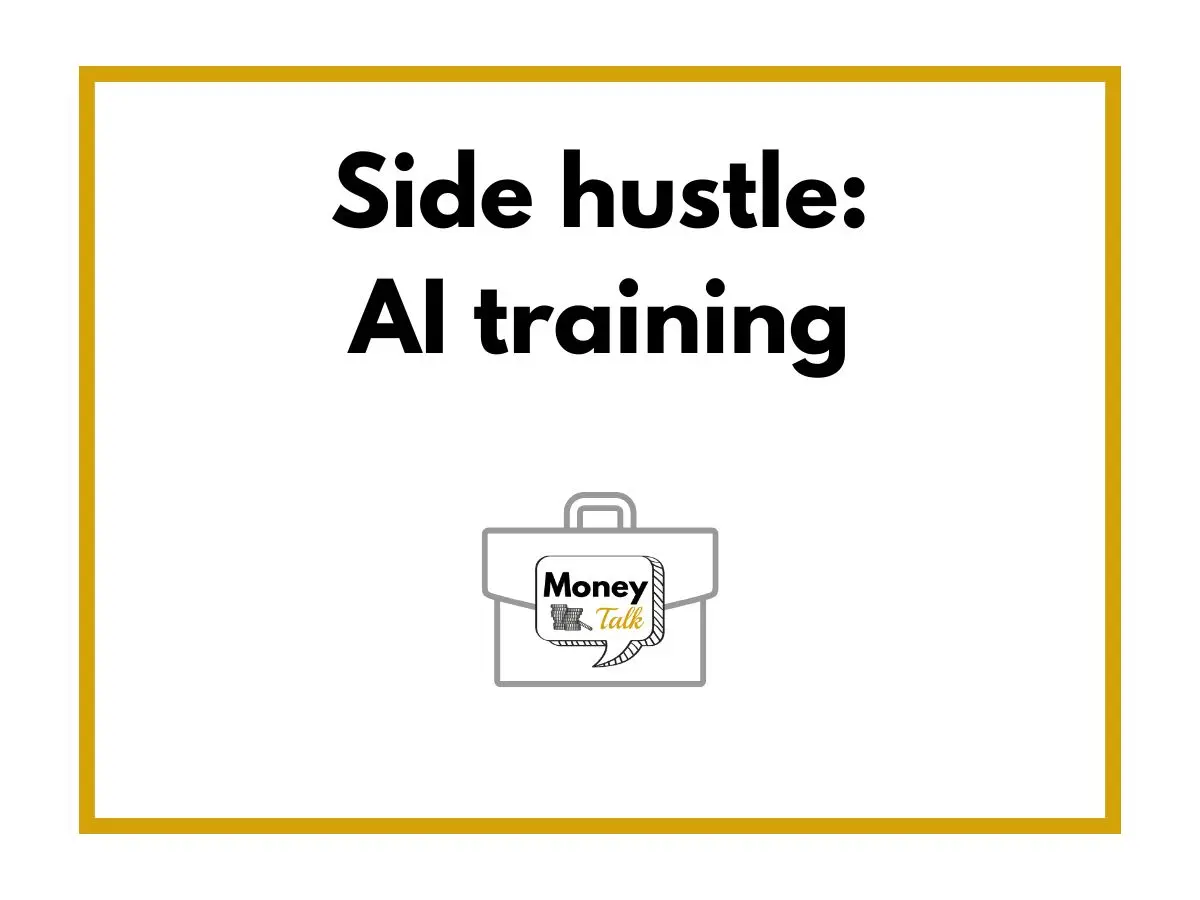AI training jobs: A great side hustle or simply not worth the time?
Money Talk is intended to inform and educate; it's not financial advice. Affiliate links, including from Amazon, are used to help fund the site. If you make a purchase via a link marked with an *, Money Talk might receive a commission at no cost to you. Find out more here.
AI might be replacing jobs but it’s also creating them. One of these new jobs is AI training.
You’ll have seen adverts for AI training jobs plastered across Facebook and LinkedIn, with phrases like “flexible hours” and “work remotely” designed to appeal to those looking to make a bit more money on the side or who want to become digital nomads.
But is AI training just a side hustle or can you make enough money to live off? And what does it actually involve?
I gave it a go to find out.
What is AI training anyway?
How you train an AI model depends on the requirements of the project and the type of AI model you’re working on.
In its most basic form, AI training involves giving the AI model a set of instructions to follow and then evaluating the output.
So you’d mimic how a normal user would interact with the AI model and then fill in a bunch of forms detailing whether it has successfully completed the task you’ve set.
In some cases, you might also be telling the model exactly how to do a task.
For example, for a large language model (LLM), which is designed to generate human-like responses, you might be tasked with asking specific questions and then deciding whether the answers are relevant and correct.
For a piece of image recognition software, the AI model might come up with descriptions of images and you might be asked to correct the description or add to it.
And for transcription or translation software, you might be presented with the finished product and asked to look for errors.
The overall goal is to identify mistakes and to help the AI model learn from them so it can work more or less perfectly for the end user.
How much do you get paid to train AI?
Unlike many other industries, adverts for AI training jobs are surprisingly upfront about how much they pay, which is typically upwards of £15 an hour.
The UK’s National Minimum Wage is £12.21 an hour for those 21 and over, and just £10 an hour for 18- to 20-year-olds, so this is slightly better than that.
However, you might have to do hours of unpaid training before you can get started, which can bring your overall earnings well below minimum wage – more on that later.
You’re also self employed – salaried jobs are rare – which means you have to pay tax and, if applicable, National Insurance contributions out of that.
The one bit of good news is that the rate of pay varies from project to project, and depends on your level of experience and expertise, so you might make quite a lot more than £15 an hour.
I worked for (or tried to work for) a few different AI training companies while researching this piece.
For reasons of confidentiality, I won’t name them and will only talk about them in general terms.
My specialism – writing and editing – was not particularly highly valued, so the most I was paid was around £20 an hour.
It was easy work with little need for brain power so it felt like a fair price.
Meanwhile, a friend of mine managed to get gigs paying around £40 an hour thanks to his PhD in physics.
His tasks were much more demanding, some requiring several hours to complete.
Sure the pay is better, but I also can’t help but feel that as an expert, you might be able to command a much higher fee if you worked elsewhere.
How do you become an AI trainer?
I was headhunted for AI training via LinkedIn but it was only after chatting to the aforementioned friend that I decided to sign up.
But you don’t need to be headhunted, know someone or have an area of expertise to sign up for AI training jobs.
In some cases, you don’t even need any qualifications.
All you need to do is Google AI training jobs and then follow the instructions to apply.
You’ll need to fill out a profile with your work history and your skills so they can match you with relevant projects.
In some cases you may also need to complete an interview task before you’re “hired”.
Before you get paid, you usually need to submit a government-issued photo ID, such as a passport, so it’s worth doing some due diligence on the company before you hand over that information.
And of course, if you’re not already self-employed, you’ll need to tell HMRC about your earnings once you make over £1,000 in a year and submit a tax self assessment.
What skills do you need for AI training?
Compared to other jobs, it’s super easy to land an AI training job because you don’t need specific skills or qualifications.
However, having extra skills or qualifications can land you more lucrative gigs so it’s definitely worth listing anything you could reasonably do well on your CV.
You won’t be able to cheat your way into a job though – or at least remain in one for long – because your work is constantly being evaluated.
If you take too long to do a project or make too many mistakes, you might be kicked off a project and you might not be paid.
More generally, you’ll need strong attention to detail because you’ll need to read and digest the instructions for a project and be able to spot mistakes that the AI model makes.
You should also be good at English – or whatever language you’re working in – because you’ll need to follow the on-screen instructions quickly.
And you should be good at solving puzzles because a lot of tasks involve trying to come up with ways to stump the AI model.
Pros and cons of AI training
AI training isn’t for everyone, and a lot of the pros and cons are quite nuanced, so that’s worth bearing in mind.
But I do think there are certain scenarios where it works really well as a side hustle or even full-time but more on that later.
Pros
In terms of pros, AI training jobs are fully remote but you can’t always work anywhere.
Often you’re hired for a specific country and need to be permanently based there, although you can sometimes work on projects while travelling.
It is however very flexible, and you can choose the hours you work.
Plus, you’ll generally be paid quite quickly as most AI training firms do weekly pay runs.
Cons
One reason why I haven’t bothered to continue with any of the AI training jobs I landed is because the rates of pay are pretty poor.
If you’re an expert in your field, you’ll probably command much higher fees doing your day job.
Your pay is even lower when you consider that you sometimes have to read several pages’ worth of instructions and complete unpaid trial or training tasks before you’re assigned paid tasks.
In one task I did, I think I spent two whole days reading the instructions and completing the training exercises.
Things balance out if you end up doing the same project for several months, but often projects will pause or end without warning and you have to repeat the cycle with a new project.
There’s also no real job security.
Project availability is never guaranteed and, if there are lots of people on the same project, the tasks can sometimes run out in a matter of hours.
And judging by the number of complaints on Reddit, the lack of actual work when you’ve completed the training is one of the biggest bugbears of AI trainers.
Of course you can mitigate it somewhat by signing up to work with multiple AI companies but you might still end up with fallow periods.
The work itself can be extremely boring, repetitive and mentally taxing all at the same time so it’s certainly not something you’d want to do for long hours or a long time.
Is AI training right for you?
If you want a low-commitment, flexible way to earn a bit of extra cash then AI training can be a good side hustle.
It’s particularly well suited to those who are studying, retired or in between jobs.
It might also be a good option for freelancers during quieter periods.
However, because there’s so little job security, it doesn’t make sense to do it as a full-time job.
And while you’ll be able to cover your bills if you get consistent work, that’s not guaranteed.
Read this: How to boost your income with side hustles
Where to find AI training jobs
As I said at the beginning, you can find AI training jobs by simply Googling the term but below is a list of tried-and-tested companies offering AI training gigs.
I’m going to caveat by saying that they haven’t all been tried or tested by me, but they are sufficiently established that you know you’re going to get paid after you complete a task.
Pin this for later







